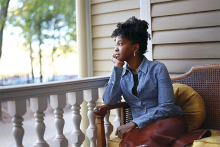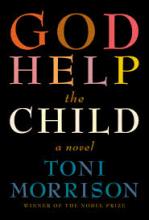color

COLOR HAS LONG fascinated me. I spend days or weeks debating color choices for knitting and art projects. As a kid, I loved mail-order catalogues for their distinctively named palettes. My shelves teemed with books containing facts about color — names for various shades, how ancient pigments were made (crushed insects, plant extracts, and sea snail secretions), and the meanings of colors in different cultures. Highly conscious of racial differences, I found this last topic compelling. I would match my favorite color that week (it changed constantly) to the meanings provided and see where my tastes aligned.
While I recall few details — such as white is a color for mourning in Japan — what I remember, unfailingly, is absence. Each time I enacted this color-play-as-identification, I imagined my way into a past, land, and set of values other than my own. Because, as with most Western maps of world cultures then and now, the cultural diversity of Africa and Afro-diasporic peoples was not represented.
Imani Perry’s latest book shows this absence to be a speaking one.

One of the best jobs I ever held was assistant manager at Grace Records. I was a founding staff member at the new and used vinyl shop in Arizona, a father and son venture that was a thrill to work at.

“WHAT YOU do to children matters. And they may never forget.”
This thread runs aggressively through Toni Morrison’s most recent novel, God Help the Child. The speaker is Sweetness, a woman who shares her family’s wounds from trying to pass for white, or “high-yellow,” for generations. Of trying to blend in well enough to drink at fountains, to try on hats in stores, to use the same Bible as whites during ceremonies. When her child and the novel’s focus, Bride, is born black, “midnight black, Sudanese black ... blue-black,” all the advancement Sweetness and her ancestors strove for dies. She loses her husband (who assumes she has been unfaithful), her social standing as a light-skinned woman, and any love for her child. “Her color is a cross she will always carry,” Sweetness says. “But it’s not my fault. It’s not my fault. It’s not my fault. It’s not.”
Bride grows up without the love of a mother’s touch and scorned for being so oddly dark, until she learns to use her color to make herself exotic and marketable. What may seem to be a character living into her identity as a black woman is really a façade in order to regain what was lost because of her skin. Of course, what Bride sees as progress is actually proof that she too has fallen into Sweetness’ obsession with what Morrison described in a recent NPR interview as “skin privilege—the ranking of color in terms of its closeness to white people or white-skinned people and its devaluation according to how dark one is and the impact that has on people who are dedicated to the privileges of certain levels of skin color.” But while race and color as social constructs are themes in the book, they are not explored as deeply or given as much emphasis as childhood trauma.
As in some of Morrison’s other novels, magical realism conveys the battle between the past and the present, the spiritual and the physical, playing a poignant, visceral part in Bride’s journey. Bride goes through a literal metamorphosis, assuming it is penance for gruesome choices she made as a child to feel alive and as an adult to feel powerful. She is numbed to what true progress and success are, constantly trying to put a fragmented identity together until she can no longer get up and must face her trauma and changing body.
The only people in the novel who allow themselves to truly heal are a child named Rain and an ex-convict named Sofia. They speak to the power of self-forgiveness. Too often we carry the shame and hate handed to us by other people’s evil, whether from childhood trauma and abuse or complacency and apathy as adults. While we can and must be held accountable for our own mistakes, we must also be willing to take off the shroud of self-loathing and guilt, and move forward past trauma into self-acceptance and healing. Both Rain and Sofia, young and old, can see the power of blame and regret and refuse to walk that path, while Bride, her lover Booker, and her mother Sweetness will arguably always drag the sins of their forebears behind them.
“What you do to children matters. And they may never forget.”

EVEN AS SOUTHERN states—and GOP candidates—jumped through hoops to distance themselves from the Confederate flag, a backlash erupted among those claiming the flag was merely a symbol of “heritage.” Battle-flag waving Southerners (and Confederacy sympathizers) seemed to leap at the opportunity to wave their banner high.
But what about the rest of us? One of the most profound statements I’ve heard recently came from Rev. Jin Kim, founding pastor of Church of All Nations in Minnesota. This Korean-born pastor stood at the podium of the Sojourners Summit and said with conviction: “I am a white supremacist.”
How can this man, a person of color who’s dedicated his life to ethnic and cultural reconciliation, be a white supremacist? The same way any of us can. After all, at its heart white supremacy is not about white hoods, battle flags, and burning crosses. Those symbols are what we call explicit bias. People know when they are practicing it.
But most often white supremacy is about implicit bias that favors whiteness. It’s about the unconscious associations we make in our minds before we even know we’ve done it. White? Rich. Black? Poor. White? Good. Black? Bad. White? Trustworthy. Black? Scary. You get the idea.
These are the unconscious biases that shape the way we order our lives; the communities we live in, the places we shop, the churches we attend, the leadership from others we accept (or reject), and the policies we support (or don’t).
It’s not hard to fume at the thought of the killer of Mother Emanuel’s Nine. And it feels good to click “like” and share posts calling for the removal of Confederate flags.
But if we stop there, bias beats us. It is the unconscious biases of the masses that keep us from moving forward, not the explicit biases of the few. So, check out this tongue-in-cheek list of four easy ways to be a white supremacist (regardless of your own race).
1. Plan a conference on church planting with a speaker lineup so white it would make Honey Boo Boo blush. And if you want to increase your “diversity,” have one speaker of color (even if he is from India), an Asian emcee, and maybe a black worship leader.

SINGER-SONGWRITER Caroline Herring was completely naked when she truly found God.
Straight out of college, she spent three months as a missionary in China. “I was so ill-equipped,” she says now, over tea just before a show in Knoxville, Tenn. “The program was respectable—we weren’t Bible smugglers, but obviously we had an agenda.”
One of her students—a woman who had journeyed seven hours to attend English classes Herring was teaching with her fellow missionaries—took a liking to her and asked if she would leave the comfort of her air-conditioned room (with a private toilet) to join her students at the dirty, crowded bath-house, outfitted with several spigots in the ceiling. Herring believes it was a way to welcome her into their fold.
“And I felt like I was a part of humanity for the first time in my life,” Herring says, her face suddenly luminous. “My preconceived notions about the Trinity just slipped away. It was too much to comprehend, but I knew that the Holy Spirit was moving amongst us because we were people together, being kind to one another.”
Herring, now 42, says the experience changed her life. She left China a different, humbled person, with whole new ideas about what God, religion, and service were.
“I knew for sure that I had a lot more to figure out about my own place in the world before I had the audacity to spread the word of Christ across the globe,” she says.